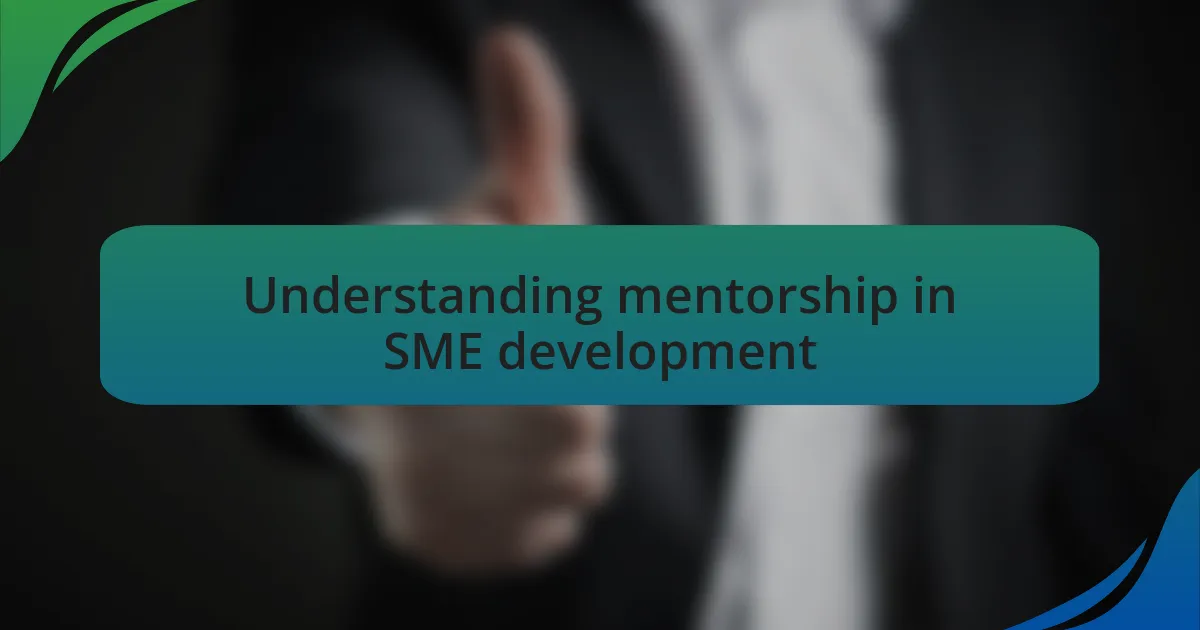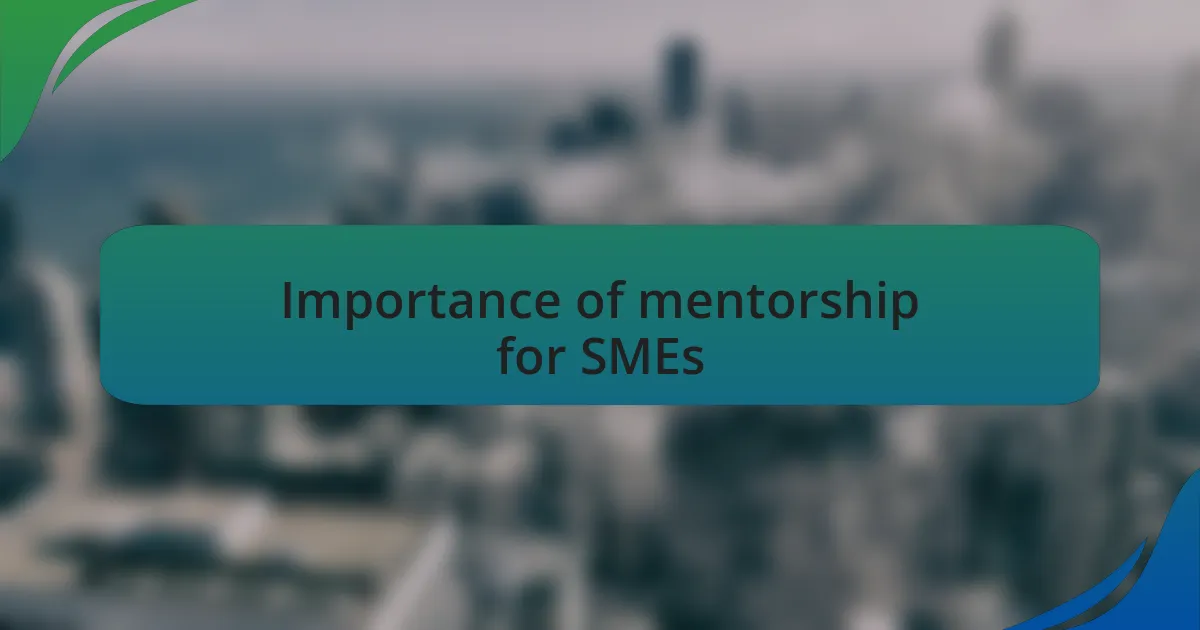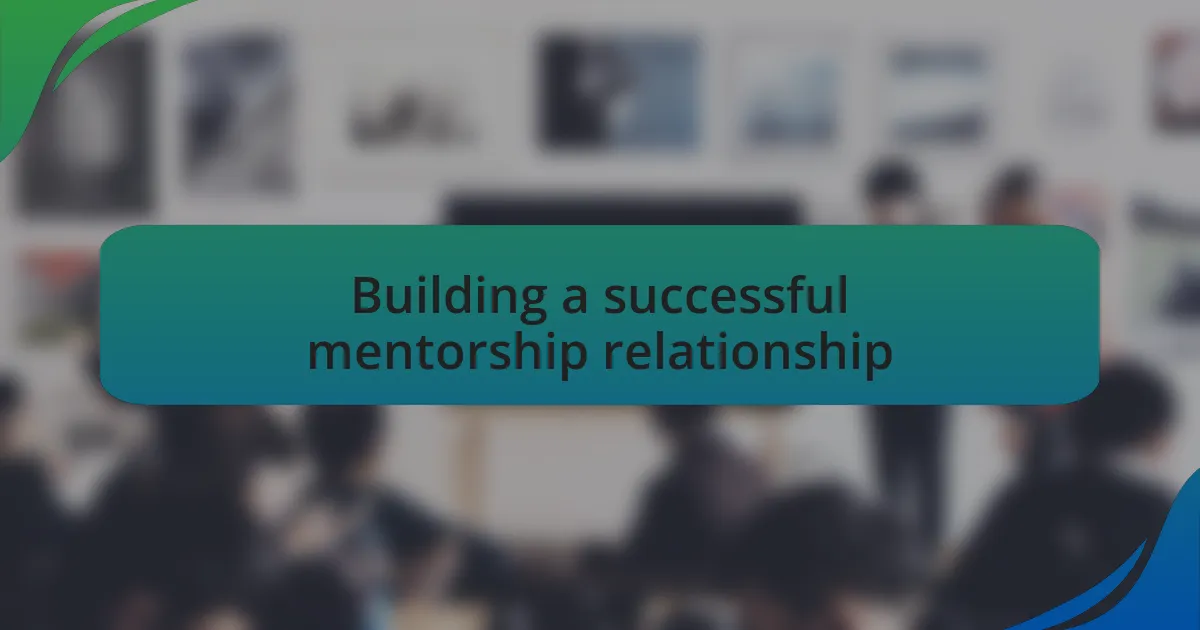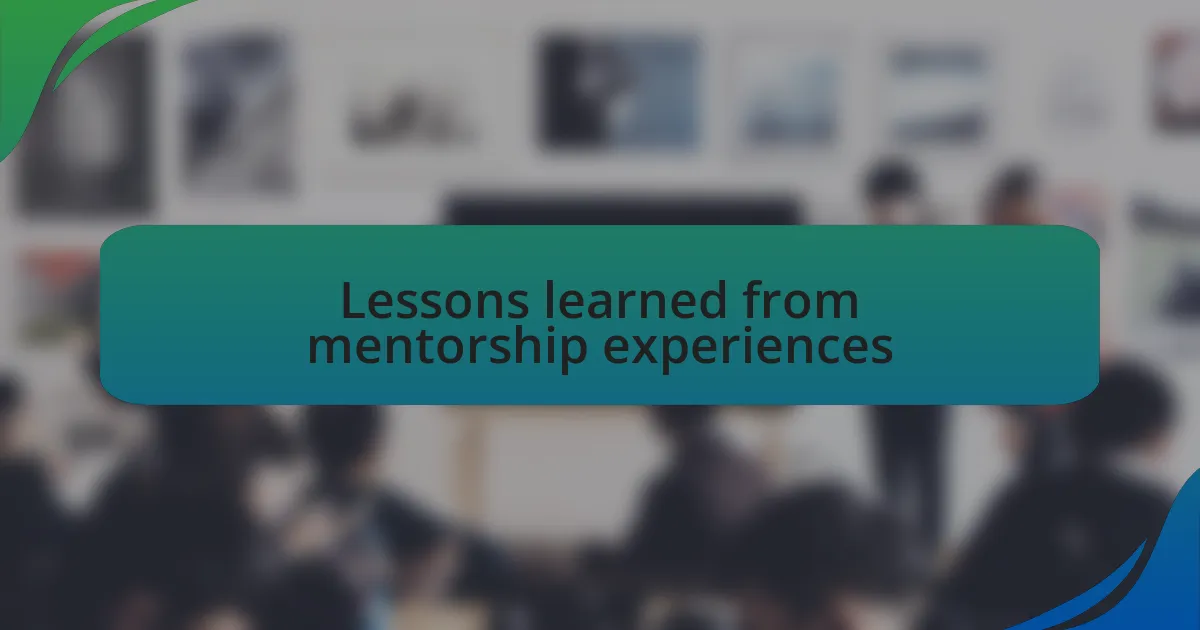Key takeaways:
- Mentorship in SME development provides not only guidance and knowledge but also emotional support, fostering trust and open communication.
- Effective mentorship accelerates learning, enhances innovation, and creates accountability, motivating entrepreneurs to achieve their goals.
- Building a successful mentorship relationship requires clear communication, mutual respect, and a focus on shared goals.
- Key lessons from mentorship include the importance of adaptability, active listening, and the power of reflection to enhance growth and learning.

Understanding mentorship in SME development
Mentorship in SME development is like a compass, guiding small businesses through the complexities of growth. I remember when I first started my venture; having a mentor was invaluable. They didn’t just provide advice; they shared insights that helped me avoid pitfalls and take calculated risks.
One often overlooked aspect of mentorship is the emotional support it provides. I found myself facing moments of self-doubt and fear, questioning my decisions. Having my mentor’s encouragement made a world of difference—it felt like having an ally who believed in my vision and capabilities, even when I struggled to see it myself.
It’s natural to wonder what truly makes a mentorship effective in the context of SMEs. Beyond knowledge sharing, it’s about building a relationship grounded in trust and open communication. I’ve experienced firsthand how invaluable it is when a mentor takes the time to listen intently, ask probing questions, and offer perspectives that challenge my thinking. These interactions foster both personal and professional growth, making the journey of entrepreneurship a shared experience.

Importance of mentorship for SMEs
The importance of mentorship for SMEs cannot be overstated. Reflecting on my own journey, I remember how a mentor’s guidance not only accelerated my learning curve but also introduced me to a network of resources I would have overlooked. Have you ever felt lost in the vast sea of business decisions? Having someone experienced by your side can transform confusion into clarity.
Mentorship also plays a crucial role in fostering innovation. I recall a pivotal moment when my mentor challenged me to think outside the box—I ended up developing a product that my market had never seen before. This kind of supportive challenge nudges entrepreneurs to explore new ideas and push boundaries, which is essential for growth in a competitive landscape.
Moreover, mentorship creates accountability. When I committed to my goals in front of my mentor, it motivated me to stay on track. It made me realize that having someone to report back to cultivates a sense of responsibility that drives success. Isn’t it fascinating how a simple partnership can significantly enhance our determination?

Key benefits of effective mentorship
Effective mentorship brings a wealth of practical knowledge that can be invaluable for entrepreneurs. In my own experience, my mentor shared specific strategies that helped me streamline my operations. It’s amazing how a few targeted insights can save time and resources—have you ever found a tiny shift that made a huge difference?
Another significant benefit is the confidence boost that comes from having a mentor’s backing. I distinctly remember a time when I hesitated to pitch my business idea to an investor. With my mentor’s encouragement, I found the courage to take that leap. Isn’t it incredible how belief from someone who has been there can propel us to act when self-doubt creeps in?
Finally, mentorship fosters a culture of continuous learning. Every conversation with my mentor was a chance to uncover new perspectives. This dynamic exchange not only enhances our skills but also keeps us adaptable in an ever-evolving market landscape. How often do we get the opportunity to learn directly from someone else’s experiences? It’s those lessons that often shape our path forward.

Building a successful mentorship relationship
Building a successful mentorship relationship requires open communication and mutual respect. I recall a time when I struggled to express my challenges to my mentor. It wasn’t until I took a leap of faith and shared my insecurities that we could address my issues effectively. Have you ever been in a situation where you feared vulnerability, only to discover it deepened your connection?
Establishing clear goals is essential, too. Early in my mentoring journey, I was unsure of what I wanted to achieve. My mentor guided me on this, helping me articulate specific milestones and expectations. That process transformed our meetings from casual chats into purposeful sessions brimming with actionable insights. Isn’t it powerful to have a clear direction when navigating the mentoring landscape?
Lastly, fostering trust is the bedrock of any successful mentorship. I remember when I shared a setback with my mentor—one that I feared would disappoint them. Instead, their understanding and support strengthened our bond and encouraged me to be candid in future conversations. How many great ideas remain hidden because we fear judgment? Building that trust not only enriches the mentorship experience but also cultivates an environment where growth can flourish.

Lessons learned from mentorship experiences
Navigating the path of mentorship has taught me that adaptability is key. During my time with one mentor, we started focused on business strategy but quickly discovered my passion lay in team dynamics. I had to be flexible enough to embrace this shift, and it ultimately enriched the mentorship experience. Have you ever had to change your course mid-journey? This adaptability allowed us to explore uncharted territories, leading to breakthroughs I hadn’t anticipated.
Another significant lesson involved the importance of active listening. In a meeting early on, I saw my mentor distracted, and I wondered if my concerns were being truly heard. It was only after I committed to asking for feedback that I recognized the value of attentive listening—not just for me as a mentee but for them as a mentor, too. Isn’t it fascinating how a simple act of being fully present can amplify the learning process for both sides?
Finally, I realized that reflection is a powerful tool in mentorship. After a particularly challenging conversation where I felt overwhelmed, I took time to journal my thoughts. This practice helped me distill the lessons learned and made our future discussions more fruitful. Have you ever reflected on an experience and unearthed insights that shifted your perspective? I find that taking a step back allows me to appreciate the growth that comes from these interactions, adding depth to the mentorship experience.